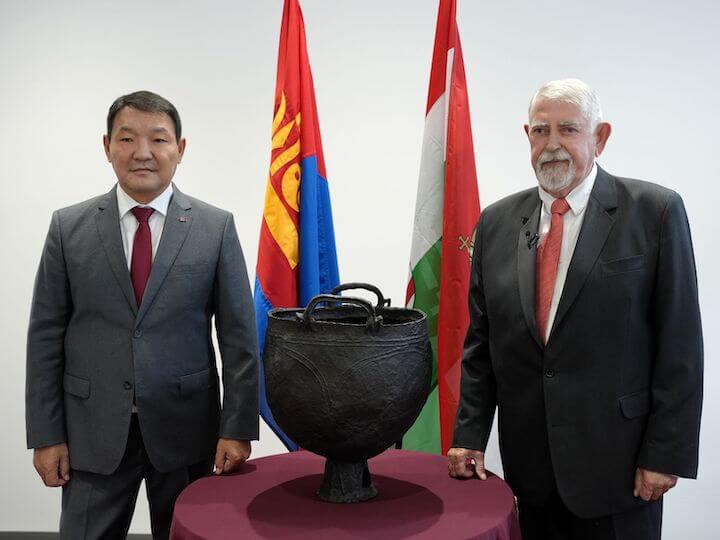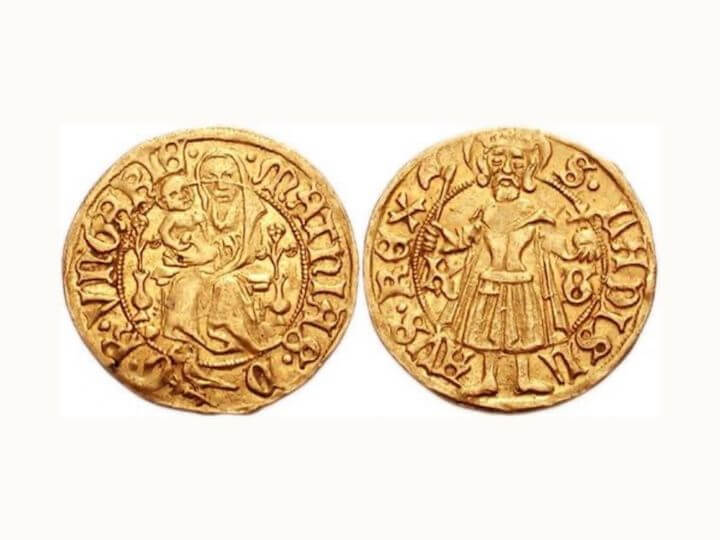
A restaurált hun üst visszakerül Mongóliába
Kétségtelenül a belső-ázsiai fémművességi körbe tartozik az a hun üst, amelyhez hasonlóak megtalálhatók már a korábbi évszázadok leletanyagában, s amelyet restaurálva a Magyarságkutató Intézet nevében Prof. dr. Kásler Miklós nyilvános keretek között a mai napon adott vissza Őexcellenciája Sainnyambuu Baatarjavnak, Mongólia magyarországi nagykövetének.
Egy magyar arisztokrata, aki a „fizika fejedelme” volt
1848. július 27-én Budán a Svábhegyen látta meg a napvilágot a legnagyobb, nemzetközileg a legjelentősebb és egyben legelismertebb magyar fizikus, Eötvös Loránd.


Meghatároztuk a Hunyadi család DNS-ét
Prof. Dr. Kásler Miklós irányításával Dr. Neparáczi Endre munkacsoportja Újgenerációs szekvenálással meghatározta mindkét Hunyadi leszármazott teljes genom szekvenciáját. Mindketten az E1b1b1a1b1a6a1c~ Y kromoszómás haplocsoportba tartoznak, amely széles Eurázsia elterjedtséget mutat.
Hadik Károly József halála
A nemrégiben bemutatott Hadik című történelmi kalandfilm főhőse, a legismertebb magyar huszár, futaki gróf Hadik András nem érte meg a francia háborúkat. A film egyik jelenetében a híres huszárt családja körében láthatjuk. Az 1757-es berlini portya előestéjén felesége, gróf Lichnowsky Franciska és három gyermek várta a tábornok hazaérkezését, Mária Jozefa (1750), János (1755) és Károly József (1756). Később, 1764-ben született András fiuk.


Velencei András trónfoglalása
Utolsó Árpád-házi uralkodónkat, III. Andrást 1290. július 23-án koronázták királlyá, IV. (Kun) László király (1272–1290) meggyilkolását követően Székesfehérvárott.
A Nándorfehérvári Diadal Emléknapja
A magyar Országgyűlés 2011-ben július 22-ét a Nándorfehérvári Diadal Emléknapjává nyilvánította.


Ferences prédikátorunk, Temesvári Pelbárt
Temesvári Pelbárt, késő középkori magyar teológusra és ferences prédikátorra emlékezünk.
Tusványos
A tusványosi programsorozat harmadik napján a Bethlen Gábor Sátor adott otthont a Magyarságkutató Intézet bemutatkozásának. Prof. Dr. Kásler Miklós főigazgató, tiszteletbeli elnök nyitotta meg az előadás-sorozatot: az Intézet küldetéséről, feladatairól, céljairól számolt be.


560 éve, 1463. július 19-én szerezte vissza Hunyadi Mátyás a Szent Koronát
1458. január 24-én Budán királlyá választották Hunyadi János volt kormányzó kisebb fiát, Mátyást. A cseh fogságból hazatérő ifjút 1458. február 14-én a budai Nagyboldogasszony-templomban a koronázási szertartás elemeit magán viselő ünnepély közepette trónra ültették, ez azonban nem jelentette azt, hogy teljes jogú uralkodóvá vált, hiszen a magyar szokásjog szerint csak az lehetett az ország törvényes királya, akinek fejére Székesfehérváron az esztergomi érsek helyezi fel a Szent Koronát. Mátyásnak azonban nem volt birtokában a klenódium, azt csak meglehetősen hosszú idő után, öt év elteltével sikerült visszaszereznie.
A doni hídfőcsaták kezdete (1942. július 18.)
Miután a „Blitzkrieg” kifulladt Moszkva alatt, a németek benyújtották revíziós támogatásukért a számlát, és az 1942. évi nyári offenzívához a teljes magyar haderő frontra küldését követelték, amelyet a magyar fél egy hadseregre alkudott le. Az 1942. június 28-án megindított támadás során jutott el a magyar királyi 2. honvéd hadsereg a Don partjára, ott kellett megvédenie a Magyar Haza határát.
